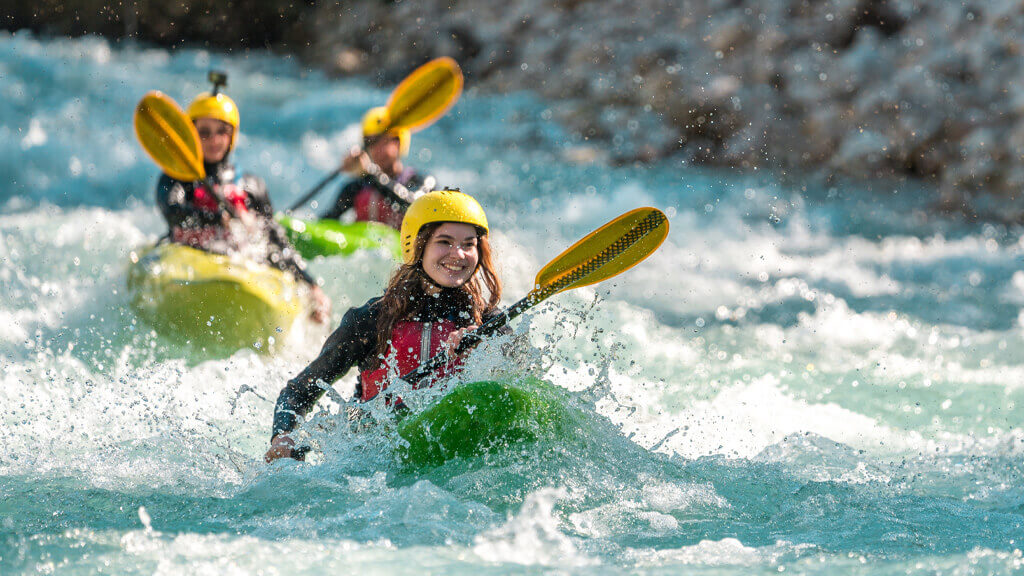Home > Blog > Everyday > Water sports: how to prepare and what precautions to take?
Water sports: how to prepare and what precautions to take?
You have decided to try kitesurfing this summer? To finally get your PADI diving certificate? Or to join friends on their sailboat? Water sports appeal to many with their promise of adventure and thrills. Unfortunately, the saying “accidents happen” also applies to water sports. Especially when you are not used to the two powerful elements of water and wind. Here are a few tips to help you prepare properly, avoid unnecessary risks and enjoy the pleasures of water sports with peace of mind.

Are water sports really so dangerous?
Water sports encompass a variety of activities. There are board sports (surfing, kitesurfing, wakeboarding, etc.), wind sports (sailing, windsurfing), underwater sports (scuba diving, snorkelling) and motor sports (jet-skiing, water-skiing). Also last but not least, adventure sports such as canoeing, rafting and even.
Each of these activities carries its own risks. Here are a few statistics to give you an idea of the real risk. In France – the favourite holiday destination of Luxembourgers – SNOSAN (Système national d’observation de la sécurité des activités nautiques) carried out 5,923 search, rescue and assistance operations in 2022, all categories combined. Sadly, this figure only represents a fraction of injuries and other nautical incidents.
Putting this into the perspective of other figures: The American Journal of Sports Medicine reports an average injury rate of 6.6 per 1,000 surfing sessions. Also according to the FFESM (Fédération Française d’Études et de Sports Sous-Marins), there are an average of 320 diving accidents per year involving hospitalisation and 15 to 20 deaths per year… for around 3 million dives and 400,000 to 500,000 divers.
Water sports: advice to avoid unnecessary risks
As you can see, serious accidents are not that common in all water sports and leisure activities, but they are not rare either. However, is this a reason to avoid them? Of course not!
An analysis of accident data shows that the same causes recur frequently. Here are a few essential tips to reduce the risks.
1 – Select certified schools and instructors: Trying out a new water sport or leisure activity? Make sure that the school or instructor has the necessary certifications and licences. Good initial training is crucial to learn the basics and, above all, the safety measures. I’m not sure that Brice, your friend from Nice, will think about telling you all about them.
2 – Check the weather conditions: Unsurprisingly, many water sport accidents happen during bad weather, and not just at sea: a storm or tempest can also affect rivers. So even if the weather looks good, always check the forecast before heading out, as the weather can quickly change and create dangerous situations.
Did you know that accidents are more frequent in summer? This is simply because there are more water sports and leisure activities during this season. Noticeability we also see peaks in serious accidents in the spring, for example. Why, because the weather is more uncertain and the water is colder at this time of year, there is a greater risk of drowning or thermal shock.
3 – Use the appropriate equipment: Wear appropriate safety equipment for the sport you are practising and the conditions.
Take the example of jet skis and water scooters. Despite prevention campaigns, every year, lifeguards report many injuries caused by not wearing protective suits. With these powerful, heavy and fast watercraft, the impacts are often hard.
4 – Be aware of your physical and technical limits: According to the Fédération Française des Sociétés de Sauvetage en Mer (FFSSM), around 25% of water sports accidents are linked to a lack of preparation and inexperience on the part of those involved. Also according to SNOSAN, negligence plays a key role in many summer boating incidents.
5 – Never go alone: Having a companion can save your life in an emergency – and that goes for all water sports.
When water sports turn into a shipwreck
So you’ve finally decided to sign up for that surfing course at Mimizan-Plage that you’ve been wanting to do for so long. You followed all the safety instructions and yet an accident still happened. What do you do now?
Did you hit your head hard on your board? Don’t worry, your basic health cover includes protection abroad, with the European Health Insurance Card. This free card entitles you to public healthcare in the 27 EU Member States + Iceland, Liechtenstein, Norway, Switzerland and the United Kingdom. Ask for your card at the Centre Commun de la Sécurité Sociale (CCSS).
Looking for even more comprehensive cover? Foyer’s hospital insurance enables you to cover the cost of a necessary medical transfer to your holiday accommodation or the nearest hospital during a temporary stay abroad.
If what if the accident didn’t happen in Mimizan-Plage, but in Bali? If you have suffered an injury while surfing or doing any other water sport in a country outside the EU, the European Health Insurance Card unfortunately does not cover you. The solution: travel insurance. Travel insurance protects you against accidents, but also other unforeseen events such as illness or cancellation of your trip.
Did you trip over while carrying the board and hit a car in the car park? Your personal liability insurance will cover you. At Foyer, this insurance is part of your home insurance. But it even covers you on holiday abroad.
As you can see, there are plenty of ways to experience thrills without stressing about the potential consequences. So why deprive yourself? With Foyer, surf, sail or dive with peace of mind. Take care and enjoy your sport!


